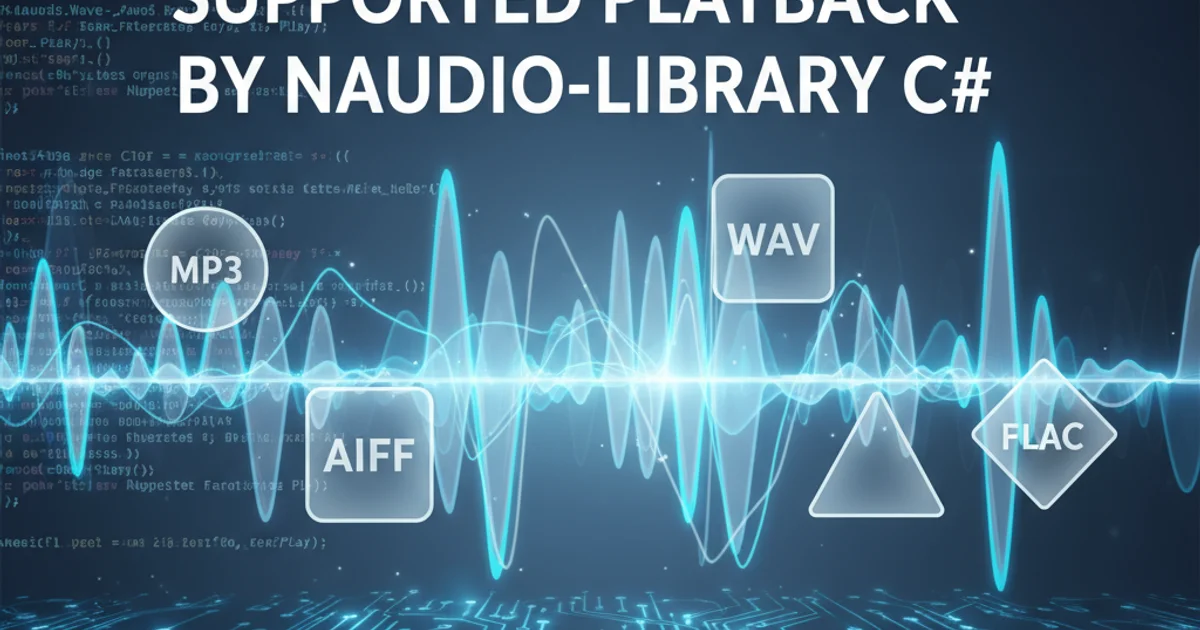What file-types have supported playback by Naudio-library C#
Categories:
NAudio Playback: Supported Audio File Types in C#

Explore the range of audio file formats NAudio, the popular C# audio library, can play back, along with common considerations and how to handle unsupported types.
NAudio is a powerful open-source audio library for .NET, widely used in C# applications for audio playback, recording, and processing. Understanding which file types NAudio natively supports for playback is crucial for developing robust audio applications. While NAudio offers extensive capabilities, its direct playback support is primarily focused on uncompressed and commonly compressed formats that can be easily decoded.
Core Supported Audio Formats
NAudio provides built-in support for several fundamental audio formats, making it straightforward to integrate audio playback into your C# projects. The primary formats it handles out-of-the-box are WAV and MP3. These are often sufficient for many common use cases, especially when dealing with uncompressed audio or widely adopted compressed formats.
flowchart TD
A[Audio File] --> B{NAudio Playback?}
B -- WAV --> C[Direct Playback]
B -- MP3 --> C[Direct Playback]
B -- Other Formats --> D[Requires Decoder/Conversion]
D --> E[NAudio Can Play Converted Stream]
C --> F[Output to Audio Device]
E --> F[Output to Audio Device]NAudio Playback Flow for Different Audio Formats
WAV (Waveform Audio File Format)
WAV files are uncompressed audio, often used for high-quality audio storage. NAudio has excellent native support for WAV files, allowing direct playback with minimal overhead. This is the most straightforward format to work with in NAudio.
MP3 (MPEG-1 Audio Layer III)
MP3 is a widely used lossy compression format. NAudio supports MP3 playback, but it typically requires a separate MP3 decoder component, such as Mp3FileReader. This class handles the decompression of MP3 data into a raw PCM stream that NAudio can then play. While not 'native' in the same way as WAV (which is often already PCM), NAudio provides the necessary components to make MP3 playback seamless.
using NAudio.Wave;
public class AudioPlayer
{
private IWavePlayer waveOutDevice;
private AudioFileReader audioFile;
public void PlayAudio(string filePath)
{
if (waveOutDevice == null)
{
waveOutDevice = new WaveOutEvent();
waveOutDevice.PlaybackStopped += OnPlaybackStopped;
}
if (audioFile != null)
{
audioFile.Dispose();
audioFile = null;
}
try
{
// NAudio intelligently handles WAV and MP3 via AudioFileReader
audioFile = new AudioFileReader(filePath);
waveOutDevice.Init(audioFile);
waveOutDevice.Play();
Console.WriteLine($"Playing: {filePath}");
}
catch (Exception ex)
{
Console.WriteLine($"Error playing audio: {ex.Message}");
}
}
private void OnPlaybackStopped(object sender, StoppedEventArgs e)
{
if (audioFile != null)
{
audioFile.Dispose();
audioFile = null;
}
if (waveOutDevice != null)
{
waveOutDevice.Dispose();
waveOutDevice = null;
}
Console.WriteLine("Playback stopped.");
}
public void StopAudio()
{
if (waveOutDevice != null)
{
waveOutDevice.Stop();
}
}
}
Basic NAudio playback example using AudioFileReader for WAV and MP3.
Extending Support for Other Formats
For audio formats beyond WAV and MP3, NAudio typically requires an intermediate step: decoding the audio into a raw PCM (Pulse Code Modulation) stream. Once converted to PCM, NAudio can play it back just like any other uncompressed audio. This approach makes NAudio highly flexible, as it can leverage external decoders or libraries to handle a vast array of formats.
MediaFoundationReader for Windows-supported formats, or FFMPEG wrappers) to decode them into a PCM stream that NAudio can then consume and play.Common Strategies for Unsupported Formats
MediaFoundationReader(Windows-specific): On Windows, NAudio can utilize the built-in Media Foundation APIs to decode various formats that Windows natively supports, such as WMA, AAC, and some FLAC files. This is often the easiest way to extend support without external dependencies, but it's limited to Windows environments.FFMPEG Integration: FFMPEG is a powerful, open-source multimedia framework capable of decoding almost any audio format. You can use FFMPEG as an external process or integrate a .NET wrapper (like
NAudio.FFMpegor similar) to decode files into a WAV or raw PCM stream, which NAudio can then play.Specific Decoders: For certain formats, dedicated .NET decoders might exist (e.g., a C# FLAC decoder). You can integrate these to convert the specific format into a
WaveStreamorISampleProviderthat NAudio understands.
using NAudio.Wave;
using NAudio.Wave.SampleProviders;
using System;
public class AdvancedAudioPlayer
{
private IWavePlayer waveOutDevice;
private ISampleProvider currentSampleProvider;
public void PlayAdvancedAudio(string filePath)
{
if (waveOutDevice == null)
{
waveOutDevice = new WaveOutEvent();
waveOutDevice.PlaybackStopped += OnPlaybackStopped;
}
try
{
// Attempt to use MediaFoundationReader for broader support on Windows
// This can handle WMA, AAC, and some FLAC files if Windows supports them
currentSampleProvider = new MediaFoundationReader(filePath).ToSampleProvider();
// If MediaFoundationReader fails or is not suitable,
// you might fall back to AudioFileReader or a custom decoder.
// Example: currentSampleProvider = new AudioFileReader(filePath).ToSampleProvider();
waveOutDevice.Init(currentSampleProvider);
waveOutDevice.Play();
Console.WriteLine($"Playing (Advanced): {filePath}");
}
catch (Exception ex)
{
Console.WriteLine($"Error playing advanced audio: {ex.Message}");
// Handle specific exceptions, e.g., MediaFoundationReader not supported
// Fallback to AudioFileReader if it's a WAV/MP3
try
{
currentSampleProvider = new AudioFileReader(filePath).ToSampleProvider();
waveOutDevice.Init(currentSampleProvider);
waveOutDevice.Play();
Console.WriteLine($"Playing (Fallback AudioFileReader): {filePath}");
}
catch (Exception fallbackEx)
{
Console.WriteLine($"Fallback failed: {fallbackEx.Message}");
}
}
}
private void OnPlaybackStopped(object sender, StoppedEventArgs e)
{
if (currentSampleProvider is IDisposable disposableProvider)
{
disposableProvider.Dispose();
}
if (waveOutDevice != null)
{
waveOutDevice.Dispose();
waveOutDevice = null;
}
Console.WriteLine("Advanced playback stopped.");
}
public void StopAudio()
{
if (waveOutDevice != null)
{
waveOutDevice.Stop();
}
}
}
Example using MediaFoundationReader for extended format support on Windows.
Summary of NAudio's Playback Capabilities
NAudio provides a solid foundation for audio playback in C#. While it natively handles WAV and MP3 (with a decoder), its true power lies in its extensibility. By understanding how to convert various audio formats into a PCM stream, you can leverage NAudio to play virtually any audio file type, making it a versatile choice for diverse audio application development.